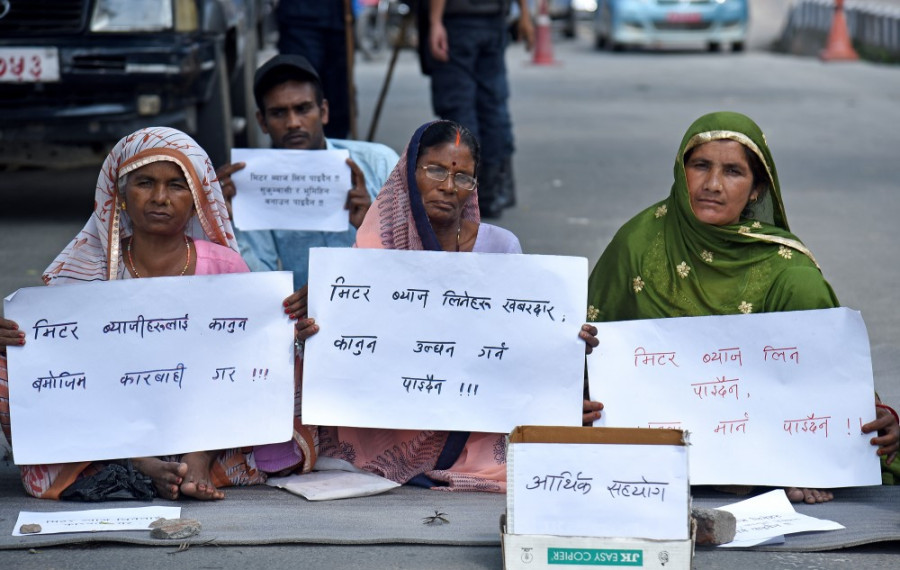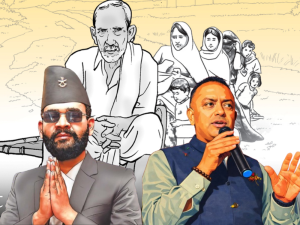Columns
Something is rotten
Protests reflect a deeper societal issue: The system is not functioning effectively.
Avasna Pandey
Now that the elections and the making and breaking of governments are well past us, it is time to consider the problems around us. Everywhere in Nepal today, there seem to be a million mutinies erupting at the street level. The media has been reporting a select few such instances, but we are failing to read between the lines. In February, for instance, transport providers held a protest against the “stringent” traffic police regulations and Kathmandu Metropolitan City’s decision to restrict long and medium distance public transportation trucks from parking anywhere other than the New Bus Park at Gongabu. The demonstration escalated into violence as disgruntled individuals ransacked a mall nearby, looting mobile phones and vandalising public property, and even setting two police vans on fire. We were too quick to call out the protestors for violence, but paid little attention to why they did what they did.
Hundreds of loan shark victims recently protested nationwide for a month, including an all-women-led walkathon from the Tarai to Kathmandu, before cancelling their protest after Prime Minister Pushpa Kamal Dahal committed to providing relief. Lest we forget, a man named Prem Prasad Acharya in January committed suicide, unable to bear the burden of long-standing debts. These are just a few instances of the individual mutinies going on in the country today as the state, engulfed as it is in political and economic crises of one form or another, continues to fail the Nepalis on a daily basis.
Political interests
Even when the media has reported on the struggling economy, including a liquidity crisis and inflation, little has been done on the policy front to address these issues. Unfortunately, the ruling coalition government is focused on its own political interests; the Ministry of Finance, as with many other ministries, remained without a minister for a month before it finally got Prakash Sharan Mahat. Political parties are more concerned with personal gain than ensuring financial stability and rebuilding public confidence in the economy. The political parties have overlooked the fact that the protests and conflicts we are witnessing are a direct consequence of the economic issues that affect people’s daily lives, and are not just isolated incidents in their petty struggles.
Protests serve as a gauge of the well-being of a country’s political or economic landscape, revealing the dynamic between its populace and governing bodies. Economic crises have been linked to numerous adverse social consequences, including a rise in incidents of violence. The reasons for this may vary, from heightened stress and financial pressure to limited access to resources and a breakdown in social cohesion and trust.
There has been a recognised correlation between economics and social unrest, supported by both theoretical and empirical evidence. Various economic factors, including poverty, inequality, unemployment and inflation, have been found to have a substantial impact on the emergence of societal upheaval. One prominent theory that explains this relationship is the relative deprivation theory. According to this theory, individuals or groups are more likely to engage in social unrest if they perceive their position in society as relatively inferior to others. For instance, if workers' wages remain stagnant while executives receive significant bonuses, they may feel relatively deprived and may be more inclined to engage in strikes or protests.
Other theories emphasise the role of economic shocks, such as recessions or economic crises, in instigating social unrest. During these times, people may experience heightened levels of economic insecurity, leading to a sense of desperation and hopelessness. This can then escalate into protests, riots or other types of social unrest. For instance, during the 1930s Great Depression, people struggled to find jobs and support their families, which resulted in significant protests and unrest in many nations. Similar to this, economic issues including high unemployment and rising food costs were a contributing factor in the 2010 Arab Spring uprisings.
In 2022, more than 12,500 protests related to the increasing cost of living were reported in 150 countries, according to data collected by the Armed Conflict Location & Event Data Project (ACLED). These protests are not only a response to high prices, but also a reflection of discontent with political leadership that allows prices to rise without taking action. They occur when people believe that they can make a difference through effective protest, and that it can bring about positive changes in political decision-making.
Since Russia’s invasion of Ukraine in February last year, there has been a steady rise in prices of essential commodities such as food, gasoline and transportation due to increased energy costs resulting from the conflict. Furthermore, Nepal’s import-dependent economy was significantly impacted by the strengthening of the United States dollar, leading to higher input costs. According to Nepal Rastra Bank, inflation was recorded at 4.24 percent in October 2021, but it escalated to 8.5 percent in October 2022. Inflation continued to increase consistently, reaching 6.04 percent in November 2021 and 7.11 percent in December 2021, with no indication of a slowdown anytime soon.
Data from the central bank indicates that the annual average rate of consumer price inflation for food and beverages declined from 5 percent in 2020-21 to 5.69 percent in 2021-22. However, prices for ghee and oil surged by 26.13 percent, while beans and legumes increased by 9.92 percent, and alcoholic beverages and tobacco goods rose by 8.57 percent. In the non-food and services category, transportation costs increased by 15.82 percent, education by 8.78 percent, furniture and home furnishings by 7.09 percent, and recreation by 6.68 percent.
In a report titled "Food, energy & cost of livingprotests, 2022'', Naomi Hossain and others say that an increase in inflation means a decrease in purchasing power in real-time, urging people to seek higher income immediately. As it leads to difficulty in planning for the future, saving and investing, inflation also results in increased social and familial stress. When a country experiences both high inflation and sluggish income growth, it can be particularly challenging for consumers, as a sustained rise in prices of goods and stagnant incomes create hardships for the people.
Loan sharks
As households struggle to make ends meet amidst rising prices for essentials such as fuel and food, unlicensed lenders are taking advantage by offering loans to the desperate at exorbitant interest rates. These individuals, who are in dire need of financial assistance, become easy targets for exploitation by lenders who impose arbitrary terms, require little to no paperwork, and demand repayment at an excessively high rate. Recent protests across the country against loan sharks serve as an example of this exploitation. The high level of economic inequality has led many to perceive the economic system as biased and unfair, particularly when social mobility is limited, and the economic elite seems disconnected from the concerns of the wider population. Protests, whether they occur locally or nationally, reflect a deeper societal issue: The system is not functioning effectively.
To address this problem, the government should take decisive action against loan sharks and improve access to affordable credit. This could involve increasing funding for microfinance institutions, expanding access to government-backed loans, and implementing more stringent regulations on lending practices. It is also crucial to provide financial education and assistance to borrowers to help them manage their finances and avoid falling into debt traps. The government should acknowledge that inflation and protests are not narrowly economic concerns, but rather indicators of a dearth of social unity and trust within society. If left unchecked, these problems could erode the ruling class’ authority and impose significant pressure on it, as demonstrated by global examples.




 12.53°C Kathmandu
12.53°C Kathmandu



.jpg&w=200&height=120)











